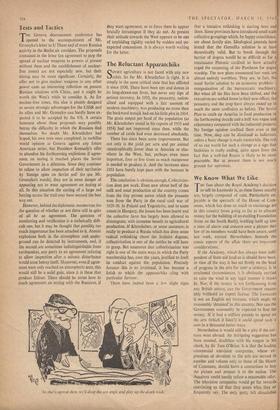Tests and Tactics
Tia Geneva disarmament conference has opened to the accompaniment of Mr. Gromyko's letter to U Thant and of more Russian activity in the Berlin air corridors. The proposals contained in the letter (an agreement to stop the spread of nuclear weapons to powers at present without them and the establishment of nuclear- free zones) are not especially new, but their timing may be more significant. Certainly, the offer not to give nuclear weapons to any other power casts an interesting reflection on present Russian relations with China, and it might be worth the West's while to consider it. As for nuclear-free zones, this idea is plainly designed to secure strategic advantages for the USSR and its allies and Mr. Gromyko can hardly have ex- pected it to be accepted by the US. A certain lameness about these proposals may possibly betray the difficulty in which the Russians find themselves. No doubt Mr. Khrushchev had hoped, his own tests once completed, to mobilise world opinion at Geneva against any future American series, but President Kennedy's offer to abandon his forthcoming explosions if agree- ment on testing is reached places the Soviet Government in a dilemma. Since They continue to refuse to allow inspection of their territories by 'foreign spies on Soviet soil' (to use Mr. Gromyko's words), they are in some danger of appearing not to want agreement on testing at all. In this situation the casting of a large red herring across the trail may have seemed the best way out.
However, behind thediplomatic manoeuvres lies the question of whether or not there will in spite of all be an agreement. The question of monitoring and verification is a technically diffi- cult one, but it may be thought that possibly too much importance has been attached to it. Atomic explosions both in the atmosphere and under- ground can be detected by instruments, and, if the second are sometimes indistinguishable from earthquakes, any party to an agreement refusing to allow inspection after a seismic disturbance would soon betray itself. Moreover, even if agree- ment were only reached on atmospheric tests, this would still be a solid gain, since it is these that produce fallout. There should be room here to reach agreement on testing with the Russians, if they want agreement, or to force them to appear brutally intransigent if they do not. At present their attitude towards the West appears to be one of unyielding rigidity varied by sudden and un- expected concessions. It is always worth waiting for the latter.


































 Previous page
Previous page